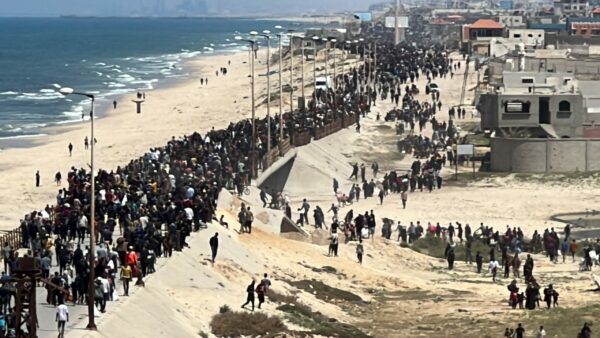By Sami Abu Salem, GAZA, Tuesday, April 16, 2024 (WAFA) – As news spread of some displaced individuals successfully crossing the Israeli army barrier on the coastal Al-Rashid Road in southern Gaza City and reaching the north on Sunday, thousands of displaced people hurriedly packed their belongings, eager to return to their homes.
The coastal road west of the Gaza Strip was congested with trucks, buses, various-sized vehicles, and carts pulled by animals, carrying tens of thousands of citizens eager to return to their homes in the northern part of the strip.
Nearly one and a half million citizens from Gaza City and the North Gaza governorate fled to the south of the Strip in the early stages of the war to avoid the flames of the Israeli occupation missiles.
On the sidewalk, Ataf Abu Saeed sat with her six children and teenagers, each carrying their bag or a plastic bag containing some clothes, food, and necessities.
She told WAFA correspondent that she was waiting for a car to take her to the Wadi Gaza area on the coastal road to reach her home in the Sheikh Radwan area of Gaza.
She added that as soon as she heard “a hint of news” about the return of some citizens, she packed some of her belongings and decided to return without a second thought, even if the news wasn’t confirmed.
“I miss our home, our beds, and our kitchen… We’re fed up and exhausted from the life of displacement,” she said.
Amidst the crowd of passengers in the truck bed, Mohammed Al-Katari was one of the most eager to return to his home in Jabalia camp in the north of the strip. He said he was returning alone to explore the road and bury his son if he could pass.
“I want to bury my son; he was martyred in an airstrike five months ago and is still under the rubble. I want to smell the earth that embraced him,” Al-Katari added to our correspondent.
The story of citizen Al-Katari echoes that of Rabee Rihean from the city of Jabalia, who also said he would return to search for his father’s body and bury him.
“My father was killed in his white car; they killed him on the coastal Rashid Street. I will return to bury him, and I will also return to my home, which I long for,” Rihean said.
For many months, the occupation forces have not allowed the displaced to return, using them as bargaining chips in ceasefire negotiations in the Gaza Strip.
As the vehicles passed Khan Yunis city and approached Deir al-Balah, vehicles carrying citizens began to return southward.
“Go back, go back, there are gunfights and bombings,” citizens shouted on the sides of the road.
An unofficial source denied the existence of a decision allowing the displaced from the south of the strip to return to their homes in the north.
Atef Qneita, from Gaza City, said he was gathering his belongings but was skeptical and feared that the occupation would open fire, as had happened several times before.
Qneita, who works as an electrician, added that he was eager to return and visit his mother’s grave, who was martyred several days ago, but he hesitated.
There, on the coastal road, one can see young men, youths, and families carrying their belongings on their backs, walking because there were no vehicles to carry them. Some carried food and water bottles and blankets for use in the expected overnight stay if they couldn’t pass the checkpoint.
“We might not be able to catch up today, so we’ll sleep and move at dawn if there’s an opportunity,” said a woman who identified herself as “Um Fareed.”
Israa Abu Al-Saeed did not hide her joy at returning to her home with her three children, who were sandwiched between her in the truck bed. She said she was determined to return even if her house was destroyed.
“My husband has been there alone for six months, and I will return to him and our home,” she said, while her daughter Namaa, a first-grade student, said she missed her father and school.

